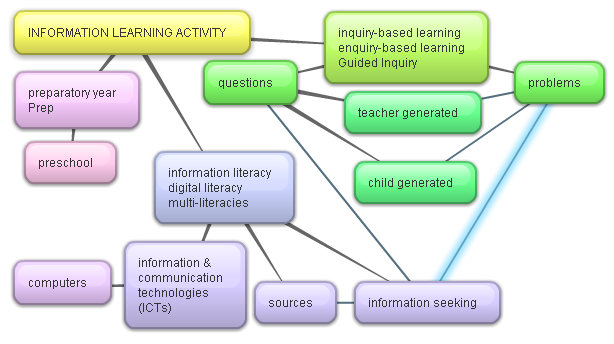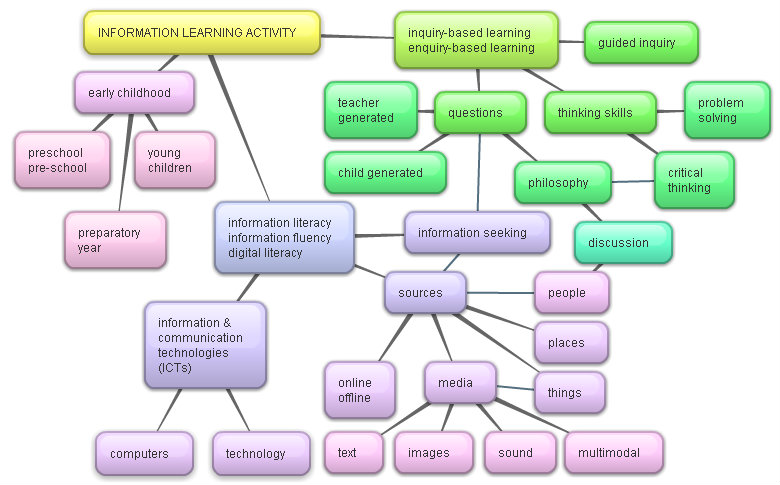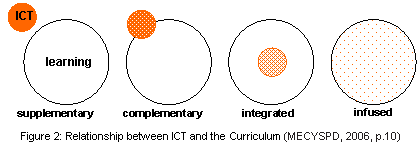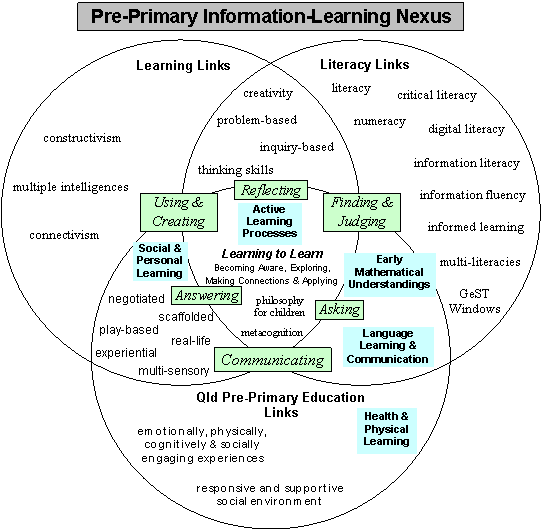Investigating the Information-Learning Nexus
1.1 Knowledge of the principles of lifelong learning (understand the principles of lifelong learning)
1.1.1 • Are well-informed about information literacy theory and practice
1.1.2 • thoroughly understand how all learners develop and apply lifelong learning skills and strategies.
1.1.3 • Have a sound understanding of how children and young adults become independent readers.
1.1.4 • comprehensively understand the role of information and communication technologies (ICTs) in lifelong learning.
3.1 Lifelong learning (model and promote lifelong learning)
3.1.1 • Empower others in the school community to become lifelong learners.
3.1.2 • Undertake research which informs evidence-based innovation in school library programs.
3.1.3 • Engage in debate on educational issues within the school community.
3.1.4 • Create and foster library-related professional development opportunities for staff.
2.2 Learning and teaching (collaboratively plan and resource curriculum programs which incorporate transferable information literacy and literature outcomes)
2.2.1 • Collaborate with teachers to plan and implement information literacy and literature programs that result in positive student learning outcomes.
A teacher-librarian's role lies at the nexus of information and learning. TLs facilitate the development of lifelong learning skills related to information seeking, analysis, creation and communication.
My studies in the Information-Learning Nexus, provided an excellent opportunity to learn more about the TLs role in developoing these skills in an early childhood setting. I negotiated an information learning activity with the children in a preparatory year class at my school to explore inquiry-based learning and information literacy practices in an early childhood setting. When I plotted my initial perceptions of the task, it looked like this.
 | My mind map seemed to indicate that information seeking was the nexus between information and learning, and the TLs role was to facilitate information seeking. I then investigated what information seeking looked like in relevant curriculum documents and a range of learning approaches. |
|
After investigating the national, state and school-based curriculum expectations and various learning approaches, I made these connections. Next I thought about what information seeking entailed, and added connections to my mind map.

Inquiry Learning and Information Literacy Models
An inquiry approach to learning is embedded in the New York City Information Fluency Continuum and the Manitoba Literacy with ICT Continuum. The Manitoba continuum is itself the result of an authentic inquiry, where a group of educators conducted action research to identify how ICTs can be used to support learning.
These sites provide descriptions of and links to more information about a range of information literacy and inquiry-based learning approaches. Information Age Inquiry and ICT NZ
Inquiry learning and information literacy are interdependent. The New York City Information Fluency Continua (2010) provides advice to teachers, school leaders, curriculum developers on the role of information and communication technology (ICT) in classroom learning, teaching, and assessment. It describes the inquiry phase of information fluency using the organisers from the Stripling model of inquiry — Connect, Wonder, Investigate, Construct, Express, Reflect.
Manitoba’s (2006, p.26) Developmental Continuum for Literacy with ICT Across the Curriculum is the direct result of ‘authentic inquiry’ — classroom-based action research. A strength of the Manitoba model is three interconnected domains — the cognitive domain of critical and creative thinking, the affective domain of ethics and responsibility and the ICT literacy domain of supporting skills.
The online support materials for the Manitoba continuum (2006) advocate the use of Super 3 or KWL Plus to support the inquiry processes of young children. The Super 3 ‘touchstones’ of Plan, Do, Review (which can be visited in any order) are a simple way to introduce young learners to an inquiry process and information seeking practices (Robinson, 2008). Using the Super 3 helps young children to develop thinking and problem solving skills and complete tasks more efficiently and effectively (Robinson, 2008). Modelling and reinforcing the language of ‘plan’, ‘do’ and ‘review’ develops students’ awareness of their inquiry and information seeking processes (Robinson, 2008).
Another strength of the Manitoba model is the purposeful use of ICT infused within learning rather than using a supplementary, complementary or intergrated approach. “An infused relationship allows the transparent application of ICT, wherever and whenever appropriate, to enhance critical and creative thinking.” (MECYSPD, 2006, p.10) |  |
This set of learning activities provided opportunities for the children to explore the topic People Who Help Us in an Emergency. Information learning activity
After implementing the information learning activity. This diagram illustrates my understanding of the information-learning nexus in early childhood education. I now see the role of the teacher-librarian as helping students to learn how to learn by promoting literacy and ICT skills and engaging students in inquiry processes and reflective discussion.
 |
|
Findings
The main findings of this project relate to the value of staff collaboration and research; the nature of learning in the early years; and the importance of developing the skills of planning and reflecting.
Curriculum planning and implementation are greatly enhanced by teacher collaboration, developing common understandings about learning approaches, and adopting a specific inquiry-based learning approach. Engaging teachers in action research about classroom practice can help them to develop shared understandings and improve professional practice.
In early childhood, the emphasis should be on learning to learn and developing communication, social and thinking skills necessary to cooperative learning. A focus on learning to learn is compatible with inquiry-based learning and the aims of information literacy (Kapitzke, 2003; Kinder 2004). Young children are naturally curious, making questions an ideal starting point for learning. Engaging children in question-driven, experiential learning and meaningful play, such as scenario specific dramatic play and problem solving challenges, will enhance learning (Lonka et al, 2007, p. 19).
Planning and reflecting are the keys to research readiness (Heider, 2009, p. 517). Teachers should involve children in identifying their own information needs, formulating their own questions and find their own solutions. However, children also need to develop the metacognitive and language skills to express their learning. Opportunities to reflect on describe and discuss their learning are essential to developing metacognition. Drama and philosophy for children provide ideal opportunities for young children to engage in reflection and critical thinking activities about real life scenarios. Through these activities, children explore their world, plan courses of action and develop metacognitive skills. Use of ICTs needs to be infused in everyday practice so that their usefulness to inquiry and information seeking is transparent. Teachers have a responsibility to provide leadership in higher order thinking, to model meta-language, by engaging children in meaningfully learning through substantive conversation (Grieshaber, 2010).
References
ALIA,ASLA. (2003). ALIA/ASLA joint statement on library and information services in schools. Retrieved 19 Oct 2008 from http://www.alia.org.au/policies/services.in.schools.html
Grieshaber, S. (2010). Beyond discovery: a case study of teacher interaction, young children and computer tasks, Cambridge Journal of Education, 40(1), 69–85. Retrieved September 26, 2011, from Taylor and Francis http://dx.doi.org/10.1080/03057640903567047
Heider, K. L. (2009). Information Literacy: The Missing Link in Early Childhood Education. Early Childhood Education Journal, 36(6), 513–518. Retrieved August 6, 2011, from EBSCOhost.
Kapitzke, C. (2003). Information Literacy: A Review and Poststructural Critique. Australian Journal of Language and Literacy, 26(1), 53–66. Retrieved September 4, 2011, from QUT ePrints http://eprints.qut.edu.au/8867/
Kinder, D. (2004). Information Literacy: A Key to Success in the 21st Century. The Greet Exchange, Spring, 2004. 3–4. Ryerson University. Retrieved September 3, 2011, from http://www.ryerson.ca/lt/publications/GREETSpr04V03Apr5.pdf
Lonka, K., Hakkarainen, K. and Sintonen, M. (2000). Progressive Inquiry Learning for Children — Experiences, Possibilities, Limitations. European Early Childhood Education Research Journal, 8(1), 7–23. Retrieved September 4, 2011, from Taylor and Francis Online. http://dx.doi.org/10.1080/13502930085208461
Nundah State School, (undated). Nundah State School Resource Centre Guide. (unpublished).